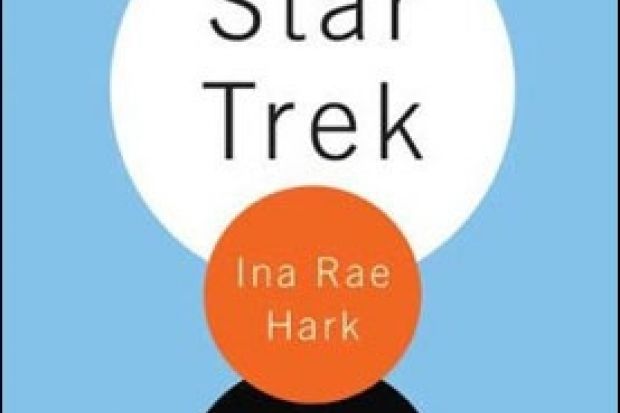Blake spoke of holding eternity in the palm of your hand. Having read Ina Rae Hark's Star Trek, I know what he means. It took an age to read a page. On the plus side, it is a slim volume.
Apparently, her friends say: "Ina was a Trekkie before they had a name for them." I'm not quite sure what name to give this study. It's a book, Jim, but not as we know it. If you want the plot summary of just about every single episode of Star Trek, Star Trek: The Next Generation, Deep Space Nine, Voyager and, finally, Enterprise, this is the book for you. Although if it is, you need help. Believe me.
Travelling to the stars, encountering new life forms, experimenting with the laws of physics - it should all be so thrilling. Or if not, at least a spur to philosophise. By the Borg, I would even have settled for a solid dose of pretentiousness. But this?
"Nearly every episode reveals that some aspect of (alien life) poses a clear and present danger to a regular character, to the Enterprise itself, and/or to densely populated planets and solar systems."
And when Hark isn't solemnly stating the blindingly obvious, she is either tut-tutting Dr McCoy for being "reactionary" or being driven "absolutely crazy" by Captain Janeway for being a "scold" instead of an "ethical exemplar".
Best of all, she reproves Deep Space Nine for showing "little sense of the total culture of the aliens of the week". Doesn't she realise there is only so much you can do in under an hour?
Hark does, however, give cautious approval to the multi-ethnic, multicultural nature of the show, with the proviso that it could do better. And really, so could she.
Look, Star Trek is about space exploration, the wonders of the Universe, the self, community; it's about encounters with otherness. It's utopian. But most of all, it is a drama. And we have no right to expect drama to flatter the mindset of "liberal" academia. Yikes. I sometimes think that critics are the traffic wardens of the imagination.
My hopes rose momentarily when the author started to talk about uniforms, because Star Trek was sexy. Men of my generation still tremble at the memory of Lieutenant Uhura spinning around in her chair to inform Captain Kirk she was picking up a strange signal. Indeed she was - the frustrated longing of teenage boys.
But the frisson turns to freeze when Hark writes, inertly, that in the original series, the officers wear gold, the scientists wear blue and the crew wear red. There is more unnecessary information to follow, all relayed with pulverising complacency.
Captain Picard, in The Next Generation, is a Frenchman with a British accent. Deep Space Nine is "set in a remote space station". The medical officer in Voyager is a hologram. Enterprise is a prequel. Fans of Star Trek will know all this so they won't want to read the book, while those who don't know it probably aren't interested and won't want to read it either.
Occasionally, Hark offers a bit more than the sort of snippet that might come in handy at a pub quiz. Star Trek reflected the Cold War and America's troubled conscience about the Vietnam War. Fear of "infiltration, invasion, infection, something from the outside getting in" - a clear reference to the panic about Aids in the late 1980s and early 1990s - dominates The Next Generation. But you can find this kind of analysis on any number of websites devoted to the series.
A stray reference to Lacan is not enough to awaken curiosity in this turgid trivia. Lacking the enthusiasm of the fan and the insight of the expert, this book goes badly where everyone has gone before.
Star Trek
By Ina Rae Hark
Palgrave Macmillan, 176pp, £12.00
ISBN 9781844572144
Published 9 September 2008
Register to continue
Why register?
- Registration is free and only takes a moment
- Once registered, you can read 3 articles a month
- Sign up for our newsletter
Subscribe
Or subscribe for unlimited access to:
- Unlimited access to news, views, insights & reviews
- Digital editions
- Digital access to THE’s university and college rankings analysis
Already registered or a current subscriber?
